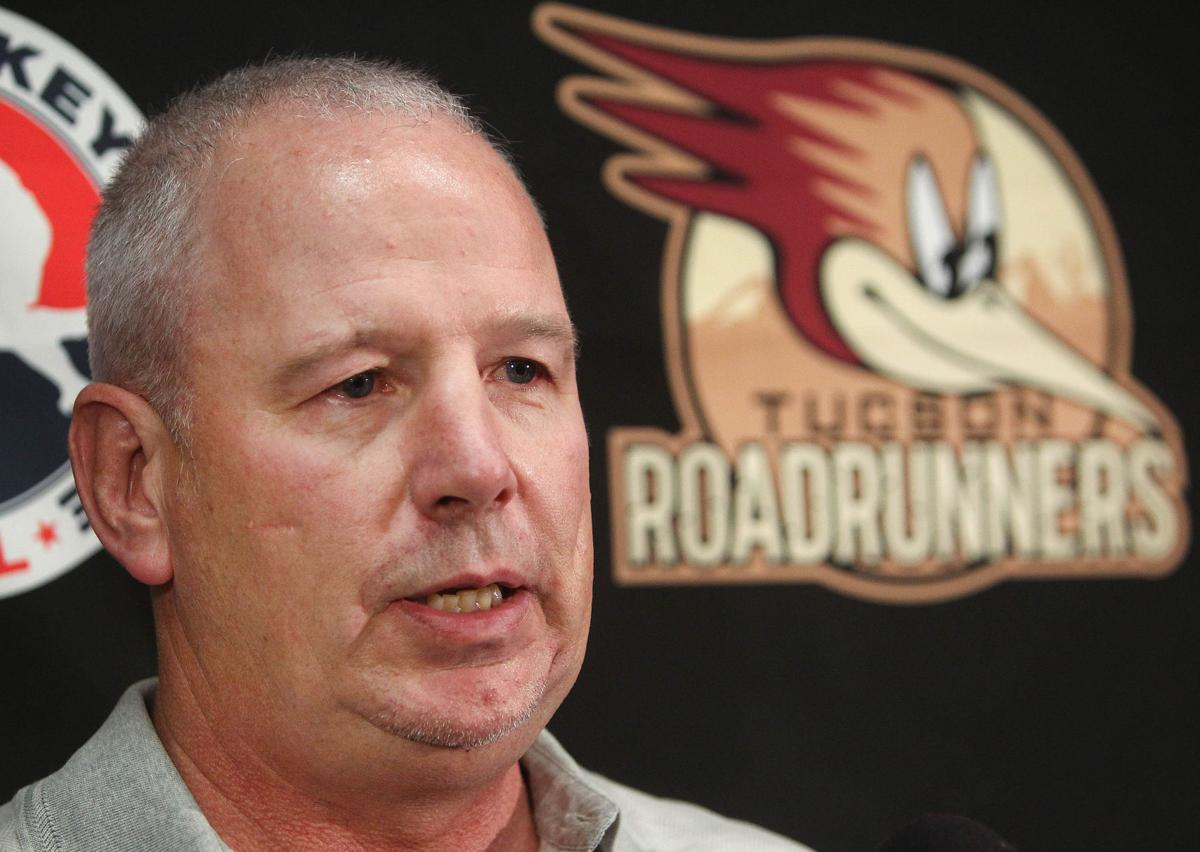The head coach of the Tucson Roadrunners is paid to handle problems. Oh, and there are always problems. Players are injured, players are traded, players are sent up to the major leagues at the last moment before a game.
And Mark Lamb handles it all at audio levels barely above a whisper. That’s the way he talks, so quietly you must strain from even a few feet away to hear him in conversation. After a win his whisper is no louder than after a loss. Steady are his words.
Lamb might be the quietest, calmest, most even-keeled head hockey coach I have ever encountered, and that is certainly not a complaint. Coaches can be notoriously loud, abrasive, insulting, and paranoid. Wow, I’ve dealt with some who are all of those at once. I’ll take Lamb’s quiet approach instead, thank you.
And don’t misinterpret Lamb’s quiet personal style as ineffectual or passive.
He can bark with the best of them in practice as he instructs his troops exactly what he wants on the ice. He is in charge, there is no doubt about that.
And I wouldn’t fault Lamb if his voice did actually raise a few decibels over the last few weeks. His club’s fairytale start hit the proverbial midnight wall and a stark new reality has set in. Remember all those potential problems — injuries, call-ups, new guys? They have all happened at once to the Tucson Roadrunners.
The team’s captain collapsed before a game and remains hospitalized with serious medical issues. Top performers have been called up to the NHL’s Arizona Coyotes, while other important cogs have suffered injuries. A recent road trip found the team at the wrong end of three- and four-goal deficits — new territory for a team that has made keeping-it-close its trademark.
“We’ve never dealt with stuff that has gone on like this, and I give the players a lot of credit,” he said. “It’s a great leadership group in there, and you try to put it together and try to lead the best you can.”
Five Roadrunners made their debuts Dec. 7, a spirited effort that ended in an overtime loss to divisional rival Ontario. His team played hard and well, and Lamb saw the positives.
“Even if you don’t win, if you are doing the right things and playing the right way, you can be happy with your hockey team,” he said.
“You say ‘good job’ and clean up some things we need to improve on, but for the most part with all the new guys it’s an excellent effort. Then you say ‘let’s go’ next time.”
And after that next time, the coach was beaming about his team’s effort, a 5-4 OT win at home last Friday. Some of that smile might come from the thousands of teddy bears tossed out on to the ice as part of a donation promotion for kids. You can’t help but smile and laugh as giant teddy bears flop onto hockey players one after another. Some Roadrunners practiced some puck-handling with the bears, too, as they were swept from the playing surface. Fun for all.
But no one would have been laughing near the Roadrunners’ locker room after the game if they had blown a three-goal lead at home.
That improbable lead came with only 11 forwards dressed — two more key guys were called up to the Coyotes shortly before the start of the game.
Tucson responded by working relentlessly. There were so few players available that there was an actual open space at the end of the bench where the missing players should be sitting. The Ontario bench overflowed. The effort from Tucson overflowed, too.
The OT winner from Christian Fischer was one of the biggest goals ever for the young franchise, stopping a four game losing skid, and reaffirming Lamb’s coaching mantra: Work hard and good things will happen.
“Christian Fischer’s effort every night is unbelievable,” Lamb said after the game. “He lays it on the ice every night. He’s only 19 years old, too, and he’s easy to coach. He’ll be a really good player in the NHL for a very long time. I can’t say enough about him.”
Then there’s Trevor Cheek, signed by the short-handed Roadrunners and up on the team’s makeshift first line in just his second game with the club.
“Trevor Cheek is a guy who has had some experience in this league. When you play with (Tucson’s Chris) Mueller, that means you’re playing against the best players from the other team.
“We thought with his experience, and he’s a really good hockey player, that he could handle that responsibility — and he showed that he could.”
I edged closer to make sure that I captured those last words, because the coach was so quiet, even while sharing such obvious satisfaction about his Roadrunners’ effort.
As his voice trailed off, I guessed that he was already thinking ahead, to the next set of problems awaiting Tucson.
And there will be more problems. Big ones. And I’ll make another guess — that there will be more relentless effort from these jumbled Roadrunners, led by a head coach thriving in the opportunity just like his team.
And then there will be winning. Quiet winning.





